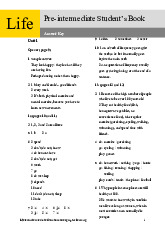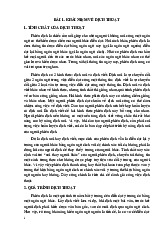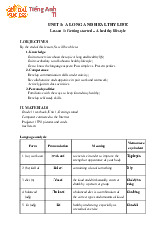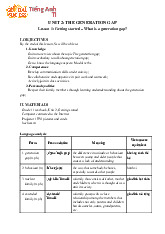




Preview text:
LESSON PLAN FRIENDS GLOBAL 11
LESSON 5B: GRAMMAR – MUST VS HAVE TO / MODALS IN THE PAST I. Objectives
By the end of this lesson, students wil be able to: 1. Knowledge
- Use different kinds of modal verbs
- Identify the sound of contraction of have
- Discuss what is considered to be a cyber crime 2. Competences
- Understand a dialogue about a problem with a phone
- Make speculations on what might have happened 3. Personal qualities
- Improve confidence in speaking English and working in groups
- Have responsibilities to use technological devices safely II. Materials
- Textbook: Friends Global 11 (Unit 5 – lesson D) - Audio track 20 – CD2 - Computer and projector III. Procedures
1. Activity 1: warm-up and lead-in (7 mins) a. Objectives:
- Raise students’ awareness of cybercrime
- Introduce a dialogue about a problem with a phone b. Content: - Story tel ing - Exercise 1, 2 c. Products: - Short stories from groups
- Oral answer for exercise 1,2 d. Organization ACTIVITIES CONTENT Story telling (3mins)
- T shows a few pictures and asks Ss to speculate cybercrime /ˈsaɪbərkraɪm/ a what has happened. crime that is committed using the internet, for example
- T introduces the word cybercrime and asks if by sending a virus to
any Ss have ever had personal experience of somebody’s computer this. Exercise 1 (2 mins)
- T lets Ss read the dialogue and decide who has - Key: Both. Archie’s a problem with their phone. phone hasn’t been
- Ss discuss in pairs and share their ideas with working for a week. the class. Freya might have
- T checks the answer as a class. downloaded malware on her phone Exercise 2 (2 mins)
- T plays the recording 2.20 for Ss to focus on the Key: /həv/ pronunciation of have
- T checks and dril s the pronunciation choral y and individual y.
- T then introduces the lesson (5D – Must vs Have to, Modals in the Past) e. Assessment
- T observes Ss’ performance - T gives feedback
2. Activity 2: presentation (10 mins) a. Objectives: - Teach Ss modal verbs b. Content:
- Exercises 3,4 and grammar builder c. Products:
- Ss’ answers for exercises 3,4 d. Organization: ACTIVITIES CONTENT Exercise 3 (4 mins)
- T draws Ss’ attention to the Learn this! box and lets them read it.
- T elicits the structure of must and have to to talk - Must / have to + about the obligation. infinitive
- T asks Ss to find must/ have to + infinitive in the dialogue in exercise 1.
- T checks answers as a class.
- T asks Ss to complete the sentences in exercise - Key: 1. Must 2. Don’t
3 and then col ects the answers and checks with have to 3. Have to 4. the whole class. Mustn’t Exercise 4 (6 mins)
- T asks Ss to read the 2nd Learn this! box and
Key: might have sent / can’t
underline the past modal verbs in the dialogue. have sent/ must have used/
- T elicits the structure and the use of different
shouldn’t have clicked/ should
modal verbs in the past and refers to the notes have warned/ might not have
in the Grammar builder section (page 123). downloaded/ could have gone e. Assessment
- T observes Ss’ performance
- T checks answers and gives feedback
3. Activity 3: Practice (15 mins) a. Objectives:
- Help Ss understand modal verbs better
- Allows Ss to complete the tasks in the book easily and successful y. b. Content:
- Grammar builder 5.2 (pages 123- 124) - Exercises 5 c. Products:
- Ss’ answers for Grammar Builder 5.2 and exercises 5 d. Organization: ACTIVITIES CONTENT
Grammar builder 5.2 (8 mins)
- T asks Ss to complete exercises 1 and 2 in the Grammar builder 5.2 Grammar builder 5.2.
- Exercise 1: 1 a 2 c 3 a
- T invites some Ss to go up to the board to write
4 c 5 c 6 c 7 a 8 b 9 c their answers. - Exercise 2: 2 should
- Other Ss check the answers on the board and have / ought to have 3 give feedback. may / might / - T corrects the exercise.
could have 4 can’t have 5 must have
6 shouldn’t have / ought not to have Exercise 5 (7 mins)
- Ss spend time doing exercise 5 on page 64.
- Key: 1 shouldn’t have
- Ss compare their answers with their desk mates. lent 2 could have
- T invites some Ss to the board to write down deleted your messages
their answers and check as a class. 3 must have sent that email 4 may not have dialed 5 should have turned 6 can’t have phoned e. Assessment
- T’s observation on Ss’ performance - T’s answer correction
- T’s feedback and peers’ feedback
4. Activity 4: Application (10 mins) a. Objectives:
- Allow Ss to use modal verbs accurately to speculate a story based on the given photos. b. Content: - Pictures from activity 1 - Exercise 6 c. Products: - Oral answers from Ss d. Organization: ACTIVITIES CONTENT
Story telling (activity 1) 3 mins
- T divides the class into groups of 4. - Ss’ own answers
- T shows Ss the pictures given at the beginning of
the lesson and asks them to retel the story using modals in the past. Exercise 6 (7 mins)
- T draws Ss’ attention to exercise 6 (p.64) and elicits what Ss can see.
- Then asks them to speculate on what might have happened.
- T walks around the class to monitor and reminds
them to use modals in the past accurately.
- T asks a few groups to share their ideas with the whole class. e. Assessment
- T observation on Ss’ performance
- T’s feedback and peers’ feedback 5. Consolidation : (3 mins) a. Wrap – up:
- If you are using the Classroom presentation tool, first do the lesson closer to
review what has been covered in this lesson.
- T asks Ss: What have you learnt today? What can you do now? (I can identify
must vs have to, and I can speculate on past events using modal verbs.) b. Homework:
- Prepare for the next lesson.




